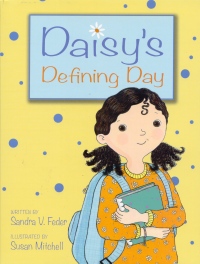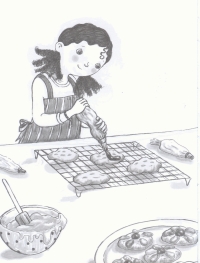| ________________
CM . . .
. Volume XIX Number 41. . . .June 21, 2013
Daisy loves words and is particularly pleased when her class starts learning about rhyming words and alliteration. But when her neighbour Grant starts calling her Lazy Daisy, Daisy is determined to come up with a better name for herself. She searches everywhere for alliterative words for Daisy, and eventually she finds her perfect name. The problem is, her new name is so long and complicated no one can get it right! Now what is Daisy to do?
Daisy's Defining Day would be good for avid early readers. The text level is appropriate, with a smattering of more difficult words to challenge them. The novel sits at just under 100 pages with illustrations, so it's not too overwhelming in length or breadth. Adding to the light and fun atmosphere of the book, the pencil-drawn illustrations by Susan Mitchell complement the story without overwhelming it. Using the same format as the first "Daisy" book, there are some large, full and half-page illustrations along with some small detail illustrations peppered throughout. The storyline here is similar to the one from Daisy's Perfect Word, focussing on words and wordplay to move the plot forward. However, the book is very gentle and, as such, drags at times. Feder fills the plot with many little details about Daisy and Emma's days that do little to add to the story. At times, the plot seems bogged down by descriptions of frozen yogurt or dance moves, and reluctant readers may lose interest in capturing the storyline. Daisy is enthusiastic, loves school and her teacher, but she also seems a little too nice to be an interesting protagonist. I would have liked her to have seen Daisy be more realistic and less one-dimensional. The stakes could be higher as it feels as though each character is the most perfect version of a person. The mother is kind, gentle, and understanding, the teacher is amazing, and even Daisy's best friend never speaks up when Daisy's name request is unreasonable. The story could benefit from a little more action or tension from any character, making readers want to find out how the problem is solved. The book includes a list at the back that mirrors the lists that Daisy makes in the book, encouraging readers to make their own word lists. For aspiring young writers, this is a great exercise, and hopefully there are kids who are inspired to make their own word books like Daisy's example.
Recommended. Stacey Matson has worked in educational and interpretive programming in cultural/historic sites across Canada. She recently finished her MA in children's literature at the University of British Columbia.
To comment
on this title or this review, send mail to cm@umanitoba.ca.
Copyright © the Manitoba Library Association. Reproduction for personal
use is permitted only if this copyright notice is maintained. Any
other reproduction is prohibited without permission.
NEXT REVIEW |
TABLE OF CONTENTS FOR THIS ISSUE
- June 21, 2013.
AUTHORS |
TITLES |
MEDIA REVIEWS |
PROFILES |
BACK ISSUES |
SEARCH |
CMARCHIVE |
HOME |

 Daisy's Defining Day, the second book in the "Daisy" series, is written for early readers of chapter books and tries to instill a love of wordplay in kids. Readers have no need to have read Daisy's Perfect Word (Vol. XVIII, No. 38, June 1, 2012) first, as each book in the series can stand alone.
Daisy's Defining Day, the second book in the "Daisy" series, is written for early readers of chapter books and tries to instill a love of wordplay in kids. Readers have no need to have read Daisy's Perfect Word (Vol. XVIII, No. 38, June 1, 2012) first, as each book in the series can stand alone.